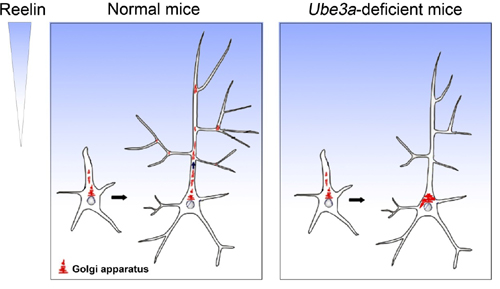Time:2013-01-06
On Jan 2, 2013, Dr. Zhi-Qi Xiong’s research group at the Institute of Neuroscience, Chinese Academy of Sciences, published online a brief communication entitled “The Angelman syndrome protein Ube3a is required for polarized dendrite morphogenesis in pyramidal neurons” in the Journal of Neuroscience.
As the primary excitatory cells of the mammalian cerebral cortex, pyramidal neuron has a highly polarized dendritic morphology, characterized by one long apical dendrite and multiple short basal dendrites. The distinct structures of these two types of dendrites determine their specific functions in receiving and integrating spatial information. However, the exact molecular mechanisms underlying development of the highly polarized dendrite morphology remain unclear. Angelman syndrome is a severe neurodevelopmental disorder caused by deficient Ube3A gene expression. The function of Ube3a in neuronal development is still largely unknown.
In this study, Dr. Zhi-Qi Xiong’s group identified a novel function of Ube3a in specifying the polarization of pyramidal neuron dendritic arbors in mice. They showed that shRNA-mediated downregulation of Ube3a selectively inhibited outgrowth of apical dendrite, resulting in impaired dendrite polarity. This defect was specifically rescued by co-expressing cytoplasm-localized isoform 2, but not ligase-dead isoform 1 or nucleus-enriched isoform 3, suggesting a requirement of the cytoplasmic catalytic function of Ube3a. Ube3a knockdown also disrupted Reelin-induced deployment of the Golgi apparatus into dendrite, a well-established cellular mechanism for asymmetric dendritic growth in pyramidal neurons. Consistently, selective inhibition of apical dendrite outgrowth in pyramidal neurons was also identified in a mouse model of Angelman syndrome.
This work identified Ube3a cytoplasm-localized isoform 2 as an important regulatory molecule for Golgi-dependent control of normal polarized dendrite development, and suggest that impairment of dendrite polarity in pyramidal neurons caused by Ube3a depletion may lead to alterations in neural circuitry that underlie behavioral and cognitive dysfunctions associated with Angelman syndrome.
This work was carried out by graduate student Sheng Miao and colleagues, under the supervision of Dr. Zhi-Qi Xiong, and supported by grants from the 973 Program, the National Natural Science Foundation of China, and the Chinese Academy of Sciences.

Schematic diagram illustrates a failure of the Golgi apparatus extending into apical dendrite in response to Reelin signaling in neurons lacking Ube3a expression. These neurons finally display stunted apical dendrite and impaired dendrite polarity.
 附件下载:
附件下载: